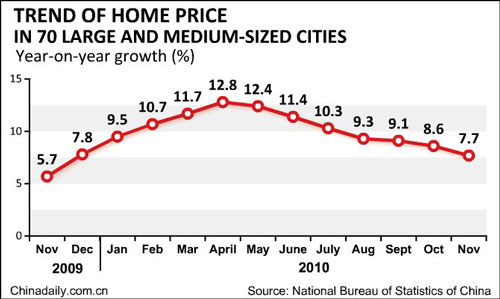Statistics
China's Nov property prices continue to rise
(Xinhua)
Updated: 2010-12-10 10:05
 |
Large Medium Small |

BEIJING - Property prices in 70 major Chinese cities rose 0.3 percent in Nov month-on-month and 7.7 percent year-on-year, the National Bureau of Statistics (NBS) said Friday.
The annualized growth rate, which peaked at 12.8 percent in April, was down from an 8.6 percent increase in October, and fell for the seventh consecutive month after the government began stepping up controls to curb prices in April.
New home prices climbed 9.3 percent year-on-year in November and 0.4 percent month-on-month. Prices for second-hand homes rose 5.6 percent year-on-year and 0.3 percent month-on-month.
Property investment rose 36.7 percent year-on-year to 462.8 billion yuan in November. That brought combined investment in the first 11 months to 4.27 trillion yuan, up 36.5 percent year-on-year.
"The slower year-on-year rise in prices was within our expectations because of last year's high base, and so is a further rise in prices," Wang Pei, an analyst with CEBM Group, an independent investment advisory firm, said.
"But the data showed market demand is more robust than we estimated," he said, referring to higher inflation as the driver.
"Inflation expectations have pushed up demand for property as an safe haven for investment compared to bank deposits and stocks, " he added. China's consumer prices soared to a 25-month high of 4.4 percent in the 12 months through October. The figure for November will be released Saturday, and analysts expect a further rise.
However, Wang saw the rebound in demand as a short-term phenomenon. He expects next week to be a "sensitive period" for tightening measures as the latest monthly price increase might fuel expectations of further government efforts to stabilize prices.
The November price increase might prompt authorities to extend the restrictive home-purchase policies to cities beyond the 14 where they currently apply, he said.
He suggested the government should strengthen public expectation of a property tax, but warned against more substantial tightening measures, which he said might mistakenly hurt the market.
The government, which is considering introducing a property tax, has introduced a raft of measures to crack down on property market speculation and rein in home prices, including suspending mortgage loans for third home purchases and raising down-payments.
The central bank twice last month ordered banks to raise the amount of money they keep in reserve, after announcing in October its first interest rate hike in nearly three years.
Yang Hongxu, an analyst at Shanghai-based E-house China Research and Development Institute, agreed the rising?consumer price index helped buoy the property market last month despite the government's tightening measures.
Additionally, Yang said expectations for a stronger yuan have led to an inflow of overseas capital into the country's property market, denting the effect of the curbs.
Yang predicted the property tax would be implemented if prices continue to rise in some major cities over the following months.
Ordinary commercial residential housing in 35 large- and medium-sized cities are, on average, about 29.5 percent overpriced, the Chinese Academy of Social Sciences (CASS), a government think tank, said in a report released Wednesday.
In a separate report Tuesday, the CASS said the cost of housing in China is expected to rise 15 percent in 2010, down from 25 percent in 2009. It also warned of a "retaliatory price rebound" in 2011 if government measures aimed at cooling the market are relaxed.
China has vowed to increase the supply of affordable housing to stabilize the market. The Shanghai Securities News reported on Dec 3 that China will build 10 million low-income housing units in 2011, compared with the goal of 5.8 million units this year.
Wang said, with more housing supply and the tightening measures still in place, prices will probably be reined in in the first half of next year.



